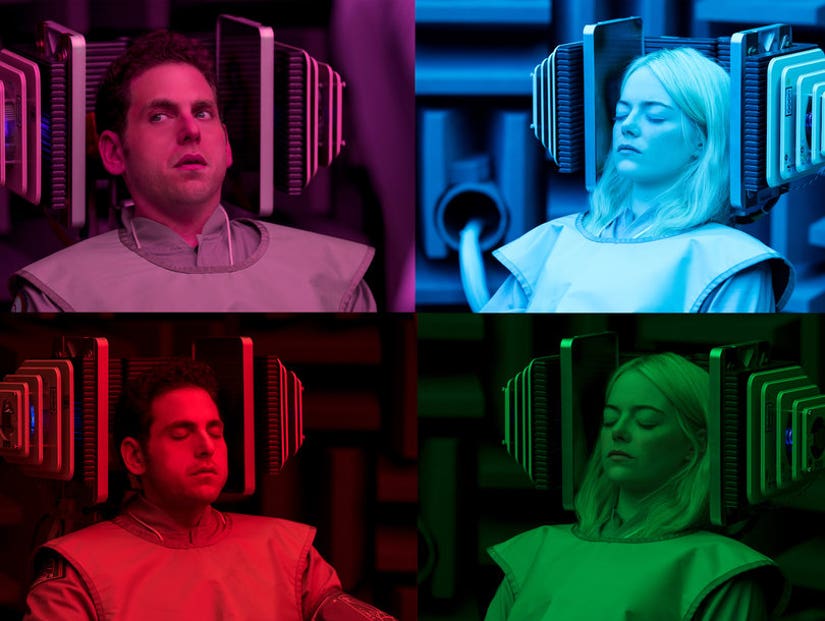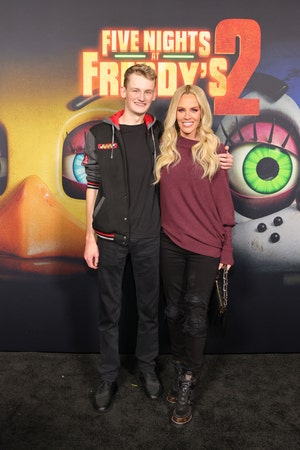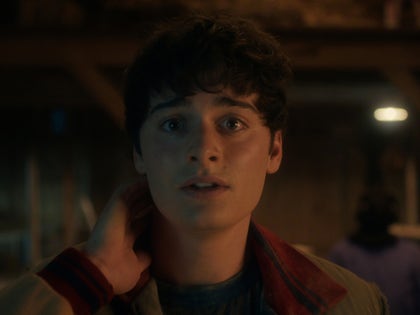We watched three episodes of the show that is stranger than "Stranger Things," and things get WEIRD. Spoilers ahead, obviously.
Netflix's new psychological dramedy "Maniac" is a straight-up mindf--k.
Created by Patrick Somerville ("The Leftovers") and directed by Cary Joji Fukunaga ("True Detective"), the genre-bending series tracks two sad-sack characters (played by Oscar winner Emma Stone and Oscar nominee Jonah Hill) as they struggle to maintain a semblance of sanity after volunteering to test experimental antidepressants in a three-day pharmaceutical trial.

'Bond 25' Finds New Critically Acclaimed Director and Fans Are Stoked
View StoryAs unconventional as the premise may be, it hardly begins to describe how mind-bendingly bizarre the show truly is. Imagine a mix between Rami Malek's narcotics-fueled hacker drama "Mr. Robot" and Noah Hawley's horror-infused, psych-ward set show "Legion," and then add a dollop of Wes Anderson's visual style and deadpan humor, a splash of Terry Gilliam's darkly comedic take on insidious bureaucracy, and a half gallon absinthe—now you're starting to get the gist.
Since Netflix dropped the 10-episode series on Friday, the internet has been abuzz with hot takes, incredulous reactions, and a general "what the hell am I watching?" sentiment.
Netflix's 'Maniac' is about an experimental psychoactive drug. Also, it kind of IS an experimental psychoactive drug. https://t.co/uqDRIIvyl6
@poniewozik
If you're watching Maniac on Netflix and you understand what the fuck's going on you're a goddamn liar
@SmileGena
Maniac - out today on Netflix - is worth your time. Every time you think you have the plot worked out, it takes you in a totally different direction.
@scottygb
Here are eight WTF moments everyone is obsessing over, along with three more weird moments many seemed to have overlooked.
 Marvel
Marvel
'Avengers 4' Directors Spark Fan Theories, Title Speculation with Picture and Two Words: 'Look Hard'
View StoryThe Moment We Realize Nothing Is What It Seems
 Netflix
Netflix
A testament, perhaps, to the seemingly unlikely times we all live in, "Maniac" follows in the footsteps of aforementioned shows like "Legion" and "Mr. Robot" which invite us to question the very nature of our own realities. Our tour guides for this ride are Owen Milgrim (Hill), a cash-strapped schizophrenic, and Annie Landsberg (Stone), a drug-addicted depressive. They serve as two very unreliable narrators whose grasp on reality is fleeting at best.
We learn this early on after Owen is deposed by his wealthy family's lawyers. He's supposed to be providing an alibi for his cocksure brother Jed (Billy Magnussen), who has been accused of committing a heinous but unspecified crime, and his father (Gabriel Byrne) and a high-powered attorney question are trying to make sure Owen will appear sane on the witness stand. While grilling Owen about his mental health, we learn he had once been institutionalized for something like schizophrenia. What we don't yet know but will soon learn is that Owen is now off his meds, so the stress of the hard questions about his past causes him to have “Jurassic Park”-style hallucinations during which his glass of water trembles like a T. Rex is traipsing about nearby.
It's merely one of many daily delusions Owen must regularly endure. Over the first few episodes he has frequent interactions with an invisible facsimile of his brother Jed, who wears a pencil mustache as a disguise (above) and keeps trying to convince Owen he is the chosen one who must somehow save the universe. Also, Owen has an inexplicable fixation with popcorn. He hears people talking about it when they aren't and sees kernels where they shouldn't be. Sometimes, they even magically begin to pop.
Ad Buddy, Friend Proxy, and Daddy's Home
"Maniac" exists in an alternate version of New York City where the digital age is still struggling to take shape, resulting in an abundance of retro-looking technology and low-fi solutions to decidedly modern problems.
Like in our universe, big-city living is difficult to afford and a gig economy has sprung up to help working-class folk make ends meet. Unlike in our universe, there aren't cell phones, laptops, or apps. What does that mean? More head-scratching moments than we can count, to be honest.
Our first glimpse of this is Ad Buddy, a service in which a company will pay for someone's smokes, food or subway fare in exchange for them allowing a real person to follow them around all day and assail them with tailor-made product pitches. There's also Daddy's Home, a "temporary volunteer mail-order husband" service Owen considers working for after getting laid off -- it pairs desperate dudes with even more desperate widows and fatherless children. Friend Proxy, meanwhile, which Annie exploits at one point to finagle her way into the pharmaceutical trial, operates along similar lines—customers pay an escort service to send them someone who hangs out with them and pretends to be their lifelong friend.
Somerville explained the strange world-building in a recent interview. "We knew that the source of the humor in 'Maniac' was not going to be mental illness," he said. "So, we wanted this heightened world also just to give us some comic energy, and some comic possibilities in the background of these other stories that are playing out."
Chess in the Park With a Purple, Gambling, Animatronic Koala
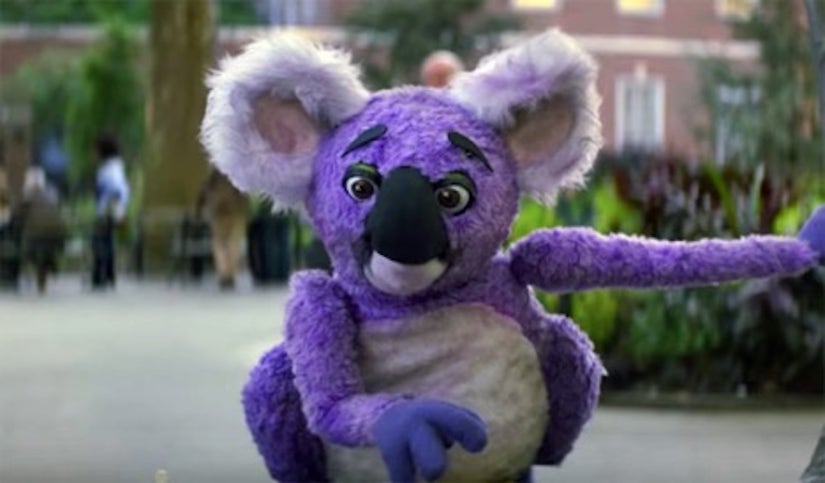 Netflix
Netflix
This one is exactly what it sounds like.
Episode 2 revolves largely around Annie's attempts to score more of the drug she's been abusing, which causes her to vividly relive the worst day of her entire life. Sounds great, right? Anyway, before enlisting in the drug trial to get her fix, she hits up her friend and previous supplier Calvin, who happens to be playing chess in Washington Square Park.
The weird part? Calvin is playing chess against a purple, robotic koala. The Muppet-looking koala beats him, too, fleecing him for $100 -- which it vows will go "right into the eucalyptus fund."
GRTA, the Artificially Intelligent Supercomputer That Cries
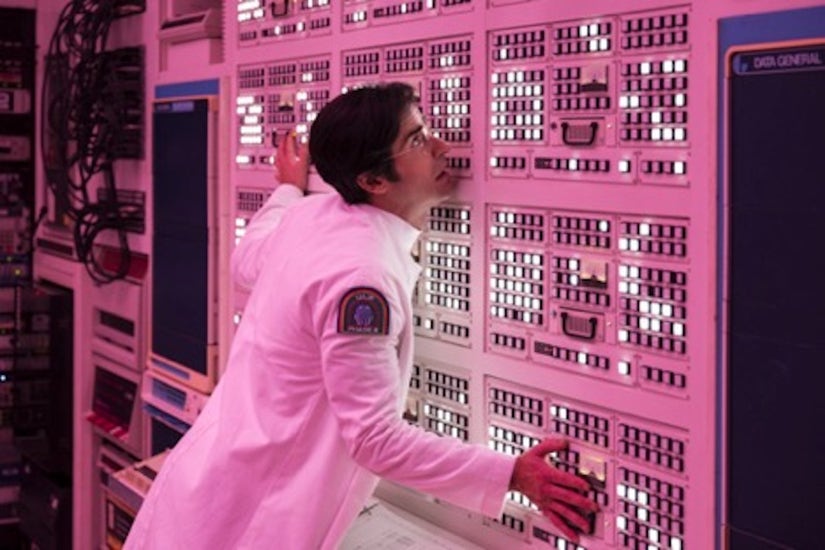 Netflix
Netflix
As mentioned, "Maniac" has a weird relationship with technology. The world has computers aplenty, but they all look like they're from 1981. There's virtual reality (which you better believe we'll get to in a minute), floppy disks, dot-matrix printing, and an abundance of microwave radiation, too, while things like digital cameras, iPhones, smart watches and selfie sticks just haven't been invented.
There's also GRTA, the world's most powerful artificially intelligent supercomputer. She -- yes, it's a she -- is roughly the size of a Volkswagen Van. Seemingly named after Dr. Greta Mantleray (Sally Field), we get our first glimpse of GRTA while the test subjects are watching a wonderfully constructed introduction video complete with cheesy music, rudimentary digital graphics, and great one-liners courtesy of test administrator Dr. Muramoto (Rome Kanda) and drug inventor Dr. James K. Mantleray (Justin Theroux).
GRTA, who is charged with calibrating the experiments for each subject, also has feelings. She cries after learning someone has died and her silver, goopy tears get all over her circuitry, resulting in some drastic changes to subsequent tests.
 Getty
Getty
Sally Field 'Glad' Burt Reynolds Won't Read Her Memoir: 'This Would Hurt Him'
View StoryJonah Hill Tries Killing Himself to a Bad Police Cover...and Fails
Owen's family is awful. We learn that early on. The Milgrims are mostly a bunch of rich, entitled, WASPy, a cappella-singing, gimlet-drinking, Balderdash-playing jerks who made their fortune in the poop-eating robot industry (we'll get to that, too).
Later, while describing for Dr. Muramoto one of the worst days he can remember, Owen recounts a story from what turns out to be his brother Jed's engagement party (the very same brother who is on trial and sometimes appears to him out of thin air). Owen has a bit of a crush on Jed's lady, Adelaide (Jemima Kirke), so he doesn't react well to the news of their betrothment.
As Jed is professing his love for Adelaide via an a cappella rendition of the Police's "Every Breath You Take,” Owen heads to the roof. He tosses aside his gimlet and jumps down to what he expects will be his own death. Except Owen doesn't die. He faceplants into a plexiglass ceiling above the party, much to everyone's horror.
While Dr. Muramoto doesn't much care about Owen's suicide attempt, he does ask some follow-up questions about Sting.
 Getty
Getty
Jonah Says He Emailed Drake WHAT?! Talks Leo Prank Too!
View StoryA Doc Overdoses on His Own Drug -- and Emma Stone Isn't Sure If It's Part of the Test Forever
Just a few scenes later Dr. Muramoto has a WTF moment of his own while Annie is in his office, opening up about her addiction to "A," the first of the three experimental drugs the test subjects must take. As she's pleading with him to remain a part of the trial, he keels over onto his desk.
She looks on in disbelief. Is this another test, she wonders? Nope, Dr. Muramoto is dead. His behavior had previously been shown to be erratic -- he was falling asleep on the job and the camera had caught glimpses of drug paraphernalia in his desk -- and we soon learn he had been freebasing "A" and "C," two of his own drugs.
While the doctor was a uniquely entertaining guy, his demise ultimately paved the way for what might be the most WTF-filled character introduction ever put to screen.
Justin Theroux Gets Caught Masturbating to Tentacle-Porn Style Virtual Reality
Dr. Azumi Fujita (Sonoya Mizuno) is rightfully horrified to discover her partner Dr. Muramoto has died, but a scientist's work is never done so she re-enlists the help of Dr. Mantleray, the man who invented the drugs being tested.
To call Dr. Mantleray eccentric would be a disservice to the word. He first appears on episode two as part of the experiment's pre-taped introduction video, but it isn't until episode three that the good doctor finally appears in the flesh -- and believe us when we say flesh.
When Dr. Fujita barges in on Dr. Mantleray at home, Theroux's character is codpiece-deep in a virtual reality accessory called a Suck Tube. He's naked but for the Suck Tube, the VR visor on his head, and the breast-like silicon balls he's mashing in his hands.
What the fuccccck am I watching? @JonahHill @maniacnetflix pic.twitter.com/cao7Z2wD2Y
@KFCBarstool
Inside the pixelated and vibrantly colored virtual world, Mantleray's many-tentacled avatar invites a winged, purple-skinned, and fully naked woman to share an open-air bath with him. She accepts his offer and before long they're in the throes of tentacle porn-inspired passion.
Meanwhile, in the real world, Dr. Mantleray is embarrassed to be caught mid-virtual coitus. He excitedly grabs his nearby toupee and accidentally knocks over an open jar of peanut butter with the bulky apparatus attached to his manhood. When he puts the peanut butter back on his desk, we catch a brief glimpse of an assortment of pornographic floppy disks (with titles like "Yellow Fever Beaver") and a magazine called Paraphiliac Monthly. Here's how Webster defines paraphilia, by the way.
 Getty
Getty
Justin Theroux Calls Jennifer Aniston Split 'Heartbreaking' In First Interview About Divorce
View StoryThe Happy White-Trash Family
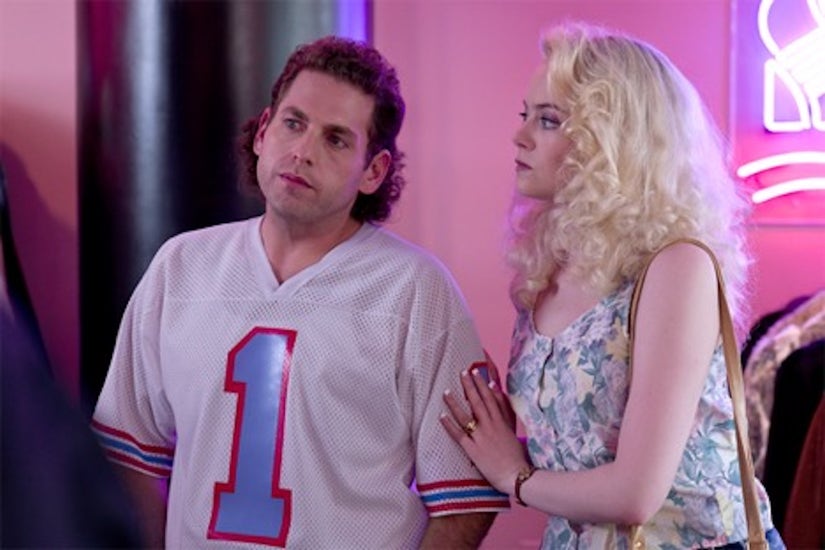 Netflix
Netflix
The third episode ends with one of the biggest WTF moments of them all. It happens just after Owen, Annie, and the rest of their compatriots pop "B," a behavioral pill helps identify the test subjects' self-defense mechanisms, so their emotional pain can eventually be exorcised.
Thanks to GRTA's tears-fried circuitry, however, nothing quite goes as planned. After popping the pill, Owen and Annie wake up in a strange new reality, one in which they're a seemingly happy couple living in a quaint suburban home. Stone's character wears too much makeup, cooks awful-looking food, and has a thick New Jersey accent while Hill's a couch potato who rocks a mullet, jean shorts, and an old Houston Oilers jersey. But at least they seem happy!
It's definitely one of the strangest cliffhangers in recent memory.
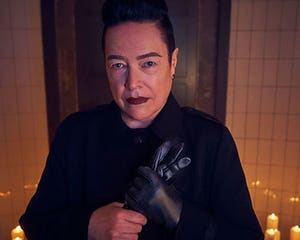 FX
FX
4 Most WTF Moments in 'AHS: Apocalypse' This Week as 'Murder House' Slips Into the Bunker
View Story3 More WTF Moments You May Have Missed
Alt-New York and the Statue of Extra Liberty
 Netflix
Netflix
For every insane plot development or bizarre character tic explored on "Maniac," a dozen other weird things are happening in the background. Take, for instance, the Statue of Extra Liberty (above). While the show doesn't spend much time overtly addressing it, this version of New York City is a bit differently than the real one.
The best and weirdest example of this is when a tour group in the background of one scene is caught admiring the Statue of Extra Liberty. Neither the statue nor the desire for additional liberty are ever really explained, but it's one of several quirks giving alt-NYC its unique flair.
Crap-Eating Robots
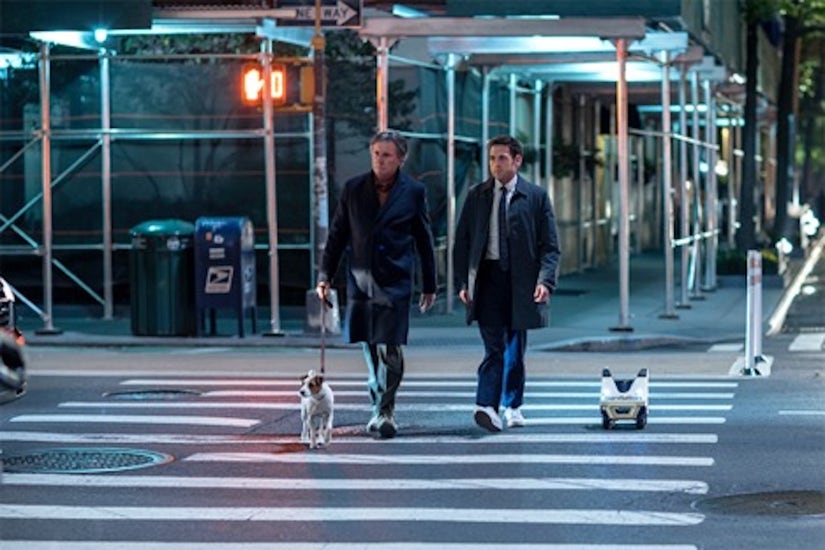 Netflix
Netflix
Blink twice and you might have missed it, but the source behind the Milgrims' wealth is revealed on the frontpage of a newspaper in the show's first few scenes: they are titans of the poop-eating robot industry.
Yes, the family (sans Owen) seemingly makes its money by mass-producing tiny, autonomous, retro-looking robots that roam the sidewalks of New York in search of dog (or, we guess, human) waste to clean up.
Milgrim family business aside, the show may have a bit of a poop fixation. When Annie purchases cigarettes with change in an opening scene, a vendor asks her a strange question: "Did you know that most quarters have been swallowed and defecated by humans?" Uh, yeah. Citation needed.
 Max Abadian
Max Abadian
Kate Hudson's Party Tips: Bring Matthew McConaughey, Drink Tequila and 'Do Not Poop in the Guest Bathroom'
View StoryA-Voiding Human Interaction
As we learn from drug-induced flashbacks, Annie's sister suffered a horrible death. Her relationship with her mom had already been strained before that, so it's really just her and her dad Hank.
She visits Hank on episode two, but we never see him. We do learn a few things about him, though. First, he likes Apple Jacks. Second, he spends nearly all of his time in a futuristic-looking metal box in his backyard. Called A-Void—presumably because it helps him avoid contact with the outside world—it looks like a cross between something Michael Jackson allegedly used to sleep in and an industrial cargo container you might find on Han Solo's Millennium Falcon.
It's unclear how Hank eats, drinks, or uses the restroom from his box of isolation, but A-Void is pretty consistent with one of the show's major themes—the strange lengths humans go to hoping to improve, alter, or even avoid human interaction.

